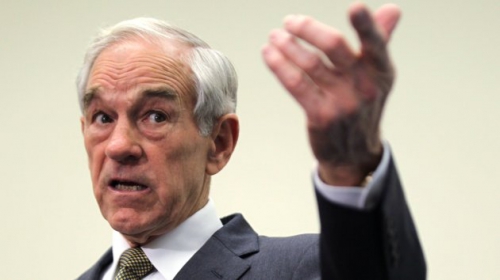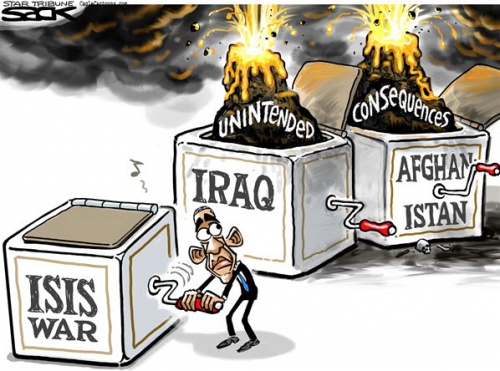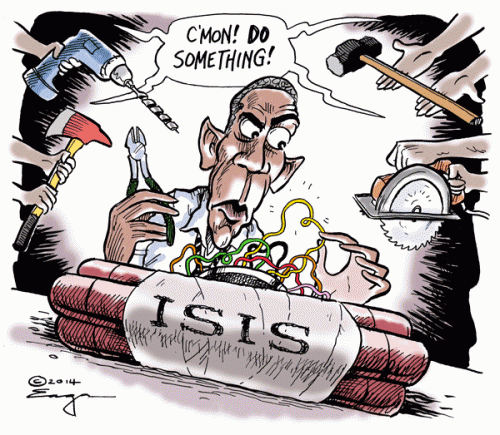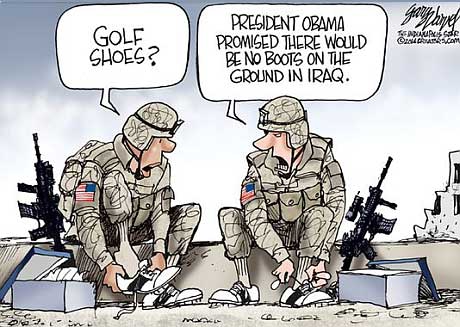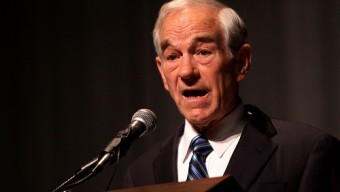Antiwar.Com
The libertarian movement has always been a contentious arena: that’s the nature of the beast. After all, we’re talking about libertarians – individualists to a fault: getting them to agree on anything is often like trying to herd cats. Aside from this question of temperament, however, there have been some very substantial ideological differences over the years, and – not surprisingly – many of these internal conflicts have been over US foreign policy.
That’s because it’s relatively easy to ascertain the libertarian position on matters domestic: government spying on our emails? We’re against it. Higher taxes? We’re against all taxes, period. The National Endowment for the Arts? Abolish it.
Easy stuff. But when it comes to foreign policy – where historical context and knowledge of facts on the ground are decisive factors – it gets more complicated. And not all are up to the task: certainly Alexander McCobin, unelected “President” of Students for Liberty (SFL), isn’t. His article for the Panam Post, entitled “Ron Paul is Wrong When He Speaks About Secession and Crimea,” is an amalgam of misinformation and smears.
After waffling on about how libertarians have to be against “unnecessary wars” (although he doesn’t say which ones are or were necessary), and paying lip service to the idea that “our generation” has a “critical attitude toward foreign intervention” (only “critical”?), he finally gets to the point:
“While it’s important criticize misconduct of the United States and some of its Western allies exacerbating the turmoil in the Middle East over the past two decades, it is also important to remember that there are other aggressors in the world; Russia – with its ongoing wars in the Northern Caucasus, the invasion of South Ossetia, and it’s most recent annexation of Crimea – being key among them.
“Former Congressman Ron Paul, whose views are interpreted by many as wholly representative of the libertarian movement, gets it wrong when he speaks of Crimea’s right to secede. Make no mistake about it, Crimea was annexed by Russian military force at gunpoint and its supposedly democratic ‘referendum’ was a farce. Besides a suspiciously high voter turnout without legitimate international observers, the referendum gave Crimeans only two choices – join Russia now or later.”
McCobin is wrong about South Ossetia: like the Crimeans, the Ossetians held a referendum and voted to separate from Georgia’s central government. In response, Georgia invaded the region, sending in its troops before the Russians ever got there. They bombarded Tsinskvali, capital of the rebel province, deliberately targeting civilians, killing and wounding hundreds. According to Human Rights Watch, Georgian artillery fired directly into basements – where civilians were sure to be hiding. As the BBC put it:
“The BBC has discovered evidence that Georgia may have committed war crimes in its attack on its breakaway region of South Ossetia in August. Eyewitnesses have described how its tanks fired directly into an apartment block, and how civilians were shot at as they tried to escape the fighting.”
McCobin hasn’t even bothered to do the most basic research: he’s simply swallowed the new cold war mythology whole. It’s easier that way.
As “evidence” for his contention that the Crimean referendum was invalid, he links to a piece by David L. Phillips, Director of the “Program on Peace-building and Rights” at Columbia University’s Institute for the Study of Human Rights,” and Carina Perelli, formerly head of the UN’s Electoral Assistance Division. Absurdly, the authors aver:
“When a referendum is properly conducted, both winners and losers accept the outcome. However chastened, losers resign themselves to defeat because of guarantees that their rights will be preserved through constitutional and other means.”
By this standard, the Ukrainian “revolution” is invalid: Viktor Yanukovich, you’ll recall, was elected to the office of President, but the opposition didn’t resign themselves to defeat: instead, they turned to the US government, which funded and encouraged a rebellion that soon turned violent. Snipers shooting at protesters and police were later identified by the Estonian Foreign Minister as being aligned with the coup leaders, who wanted a pretext to blame the government and take power themselves. Armed ultra-nationalist groups – including a fair proportion of neo-Nazis – stormed government buildings, and the opposition took power in a coup.
Oh, but Crimea’s referendum, organized by the elected Parliament, is “invalid.”
It’s not too surprising, however, that the authors of that Huffington Post piece McCobin links to would take such a counterintuitive stance: after all, the Institute for the Study of Human Rights is taking in scads of US government money from USAID – and the less said about the UN’s “Electoral Assistance Division” the better. Phillips and Perelli had better take Washington’s side if they know what’s good for them. If not, they’d soon find themselves out of a job.
What I want to know is: what’s Alexander McCobin’s excuse?
Ignorance? Only partially, I think, because he goes on to write:
“It’s much too simplistic to solely condemn the United States for any kind of geopolitical instability in the world. Non-interventionists who sympathize with Russia by condoning Crimea’s secession and blaming the West for the Ukrainian crisis fail to see the larger picture. Putin’s government is one of the least free in the world and is clearly the aggressor in Crimea, as it was even beforehand with its support of the Yanukovych regime that shot and tortured its own citizens on the streets of Kyiv.”
The oily conflation of supporting secession – which every authentic libertarian supports, everywhere, as a matter of high principle – with “non-interventionists who sympathize with Russia” is a typical neocon ploy. They did it during the Iraq war: by opposing US intervention, we were “supporting Saddam.” By “condoning” the right of the Crimean people to national self-determination, we “sympathize with Russia.” McCobin has been taking lessons in the Washington Free Beacon-Buzzfeed school of “journalism” – the two neocon outlets that, that coincidentally, eagerly took up this “story” of a “libertarian split” over Ukraine.
This isn’t a matter of being misinformed: McCobin is simply lying when he accuses the Yanukovich government of torture and murder. No one knows who employed those snipers, although the Estonian Foreign Minister clearly has his suspicions. And Ukraine is no more free than Russia: with no less than eight neo-Nazis holding high positions – including chief of the national police – in the unelected “interim government,” one could make a good argument that today it is far less free. While Hillary Clinton inanely likened Putin to Hitler, the reality is that one of the three top leaders of the coup belongs to a party that sided with the Nazis in World War II and actively participated in the Holocaust. The “muscle” that enabled the coup leaders to take over government buildings was supplied by “Right Sector,” an openly anti-Semitic pro-Nazi gang of skinheads.
Is this the movement the “libertarian” McCobin supports?
Oh, those anti-American libertarians like Ron Paul are always “blaming the West” – we’re Blame America Firsters, that’s the neocon line that McCobin would have us swallow. One of many problems with this tired argument is that there’s no such thing as “the West,” unless you’re talking about the entire population of Western Europe and North America. Libertarians blame the governmentsof those countries, which have intervened, using both hard and “soft” power, all over the world: Ukraine is no exception. The so-called Orange Revolution was financed, produced, and directed by those masters of the narrative in Washington, D.C., who messed up the country so badly that it turned to the loutish Yanukovich and threw the Orange Revolutionaries out in a free and fair election.
This is what McCobin and his fellow neocons-in-”libertarian”-clothing really hate about Ron Paul: he calls out Washington’s moral responsibility for a good deal of the misery and slaughter in the world, and rightly so. With the mightiest military machine on earth, “defense” expenditures totaling more than the top ten spenders combined, and a network of bases, protectorates, and client states larger than any rival by several degrees of magnitude, the warlords of Washington have taken every opportunity to extend the frontiers of their empire. And they don’t always do it by military means.
Ukraine is an example of conquest-by-subversion, as were the other “color revolutions” funded and directed by Washington in Georgia, Serbia, Kyrgyzstan, and elsewhere. Here is a partial list of the various Ukrainian drains US taxpayer dollars have been poured down. The level of US government involvement is so intense that we have Victoria Nuland telling the Ukrainians who they can and cannot have in their new “government.” What if the Russian government took an equally intense interest in our elections – would Students for Liberty think Putin is taking too many liberties with our internal affairs?
I’ve saved the worst for last, the part where McCobin issues a warning: “Everyone,” he writes, “should be very careful with showing sympathies to an autocratic leader such as President Putin.”
Yes, be careful, you guys, because the Free Beacon and Rosie Gray are watching you! You could be outed as a commie-lovin’ Putin-lovin’ KGB-lovin’ agent of a foreign power.
Be careful opposing US foreign policy, because you’ll be labeled a Russia-lovin’ traitor – just like that turncoat Ed Snowden.
That, of course, is what this new cold war is all about. Or is it just a coincidence that the Red Dawning of Washington is occurring as Snowden’s revelations of US government spying are ongoing? Snowden’s name never comes up in McCobin’s screed, not even to remark in irony that this libertarian hero has been given asylum by a government that is “one of the least free in the world.”
I did find some mention of Snowden on the Students for Liberty web site, however, including this piece describing an interview with the head of SFL’s European division – a televised segment on “Russia Today,” the Putin government’s state-owned station.
I, for one, have a policy of not appearing on any state-run propaganda media outlet, including not only Russia Today, but Voice of America, Al Jazeera, and any other government-funded venue. That doesn’t mean I hold it against the European SFL for taking the opportunity to spread their message: but I refuse to be threatened by the SFL about how I have to be “careful” lest I’m guilty of “showing sympathies” for the “autocrat” Putin when SFL is being given a platform by that very same “autocrat.”
So why were the Free Beacon, Buzzfeed, and Dave Weigel all over this ginned up brouhaha? Because of McCobin’s parting slime-ball:
“In contrast to his father, Senator Rand Paul gets it right by condemning Russian aggression while not subscribing to hawkish calls for military intervention at the same time. It is one thing to not intervene; it is another thing to applaud an autocrat for the sake of blaming our own government.”
This is laughable. As Jonathan Chait noted, Rand Paul’s boilerplate “get tough” rhetoric didn’t quite match his concrete proposal, which was to cut off all aid to Ukraine. Rand also warned against “tweaking Putin” after the coup leaders seized power. So there is no policy split between father and son: as both Rand and Ron have said, it’s a difference not of substance but of style. Yet they also have different goals: Ron set out to educate the public so that someone like Rand could actually get elected President.
The neocons won’t be happy until and unless Rand Paul commits the political equivalent of patricide – and makes the catastrophic mistake of cutting himself off from his national political base. They are absolutely terrified that the junior Senator from Kentucky is now the acknowledged frontrunner in the race for the 2016 GOP presidential nomination, and they’ve just begun their work. They naturally picked as their first target the soft underbelly of the campaign – the libertarian movement itself, which is split into the real grassroots movement expanded and renewed by Ron Paul, and the astro-turf creation of the Koch brothers, Charles and David Koch, of which SFL is one of many appendages.
The actual grassroots libertarian youth group – with a real membership of over 7,000 – is Young Americans for Liberty, founded by Ron Paul’s organization. YAL now has over 500 college and high school chapters. They are wisely staying out of this neocon-engineered ambush.
McCobin, on the other hand, represents nothing and no one – not even his own organization. Indeed, his foreign policy views are way out of the libertarian mainstream, if I may be permitted to utter such a phrase. In a piece for “Cato Unbound” attacking what he called a “libertarian purity test,’ he averred:
“While many libertarians opposed the invasion of Iraq, Randy Barnett wrote a strong, libertarian defense of pre-emptive intervention. While libertarians agree on things like the need for minimal government, there are many open debates on the specific policy prescriptions a minimal government would entail.”
Those libertarians, like Ron Bailey and Brink Lindsey, who supported the invasion and occupation of Iraq have long since penned their mea culpas. The issue is settled within the libertarian movement – except for Alexander McCobin. So who is this guy, anyway? He’s the “president” of a Koch front group with lots of money and very few activist members who had “come to Washington on a Charles Koch Institute fellowship,” according to Dave Weigel. The Kochs, in spite of their popular reputation, have long since given up pushing a libertarian agenda; and foreign policy is the very least of their concerns. They never gave Ron Paul a dime, and their paid minions trash-talked him at every opportunity.
When the Campaign for Liberty, the Paul organization, founded a youth group the Kochtopus quickly jumped in with SFL – which never amounted to any real competition because it concentrated mainly on staging a series of expensive conferences, with generous scholarships and students flown in from all over the world. Like all Koch Astroturf outfits, this one is run from the top, and while there’s plenty of debate – indeed, SFL is little more than a debating society – there’s less democracy than in Putin’s Russia, which at least goes through the motions of holding elections.
In response to inquiries over Twitter, SFL tweeted that McCobin’s statement was “just a statement by individuals,” and – incredibly – that “SFL doesn’t have an official stance on foreign policy.” Yet every story covering this episode headlined the alleged “libertarian split” over Ukraine.
Of course there is no such split. We American libertarians know who and what is the main danger to peace and freedom in this world, and it sure isn’t the leader of a has-been semi-Third World backwater like Russia.
For a group with no “official stance” on foreign policy, the SFL web site has a lot of gosh wow puff pieces prettifying the Ukrainian coup. And they’re hot on the Venezuelan opposition, too: indeed, they have a list of articles on both countries on the same page. What do these two nations have in common? They’re both being overrun by the American Regime-Change Machine, and SFL is cheerleading the effort – “unofficially,’ of course.
While SFL doesn’t have a lot of actual functioning chapters, and consists mainly of a self-appointed leadership fueled by plenty of Koch money, it does indeed have some actual grassroots members and one has to wonder what they think – and whether they were even consulted. How do they feel about being fed a line that is identical in all respects to the one being taken by the Obama administration – and the Weekly Standard? How do they feel about the President of their organization going public with the accusation that Ron Paul is “applauding an autocrat” – because he supposedly hates America?
In McCobin’s world, if you support the right of the Crimeans to vote on their own future you are ‘applauding an autocrat for the sake of blaming your own government.” After all, being a libertarian, you probably hate your own government – because you hate all governments, now isn’t that right? Even to the extent of going over to The Enemy, whoever that may be at the moment: Saddam Hussein, Vladimir Putin, or the Devil himself.
Yes, you’re a traitor, that’s what you are – just like Edward Snowden.
NOTES IN THE MARGIN
You can check out my Twitter feed by going here. But please note that my tweets are sometimes deliberately provocative, often made in jest, and largely consist of me thinking out loud.
I’ve written a couple of books, which you might want to peruse. Here is the link for buying the second edition of my 1993 book, Reclaiming the American Right: The Lost Legacy of the Conservative Movement, with an Introduction by Prof. George W. Carey, a Foreword by Patrick J. Buchanan, and critical essays by Scott Richert and David Gordon (ISI Books, 2008).
You can buy An Enemy of the State: The Life of Murray N. Rothbard(Prometheus Books, 2000), my biography of the great libertarian thinker, here.
Read more by Justin Raimondo
- Taking on Putin: The Gessen Plan – March 23rd, 2014
- Ukraine’s Mysterious Snipers – March 20th, 2014
- Was the Crimean Secession Vote ‘Legitimate’? – March 18th, 2014
- From Iraq to Ukraine: A Pattern of Disaster – March 16th, 2014
- Let Crimea Go! – March 13th, 2014



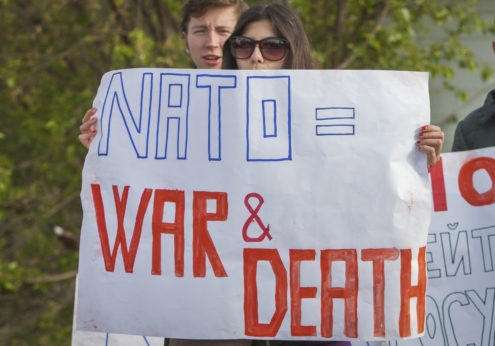
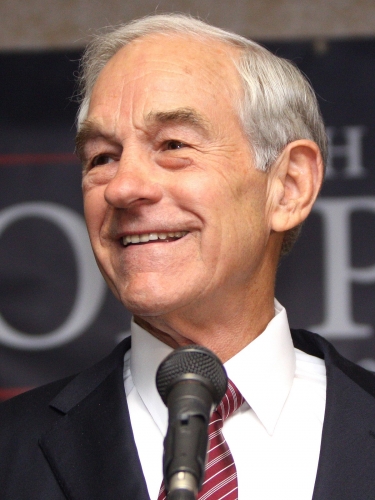


 del.icio.us
del.icio.us
 Digg
Digg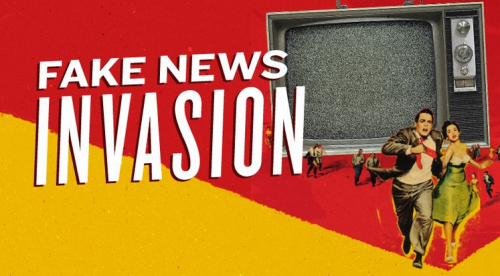

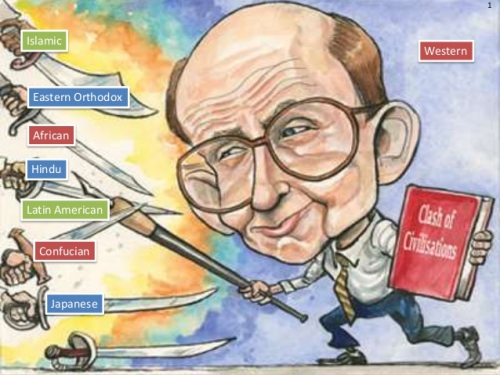
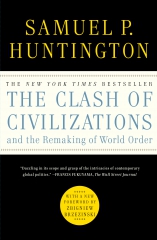 Huntington, in his 1996 book “
Huntington, in his 1996 book “